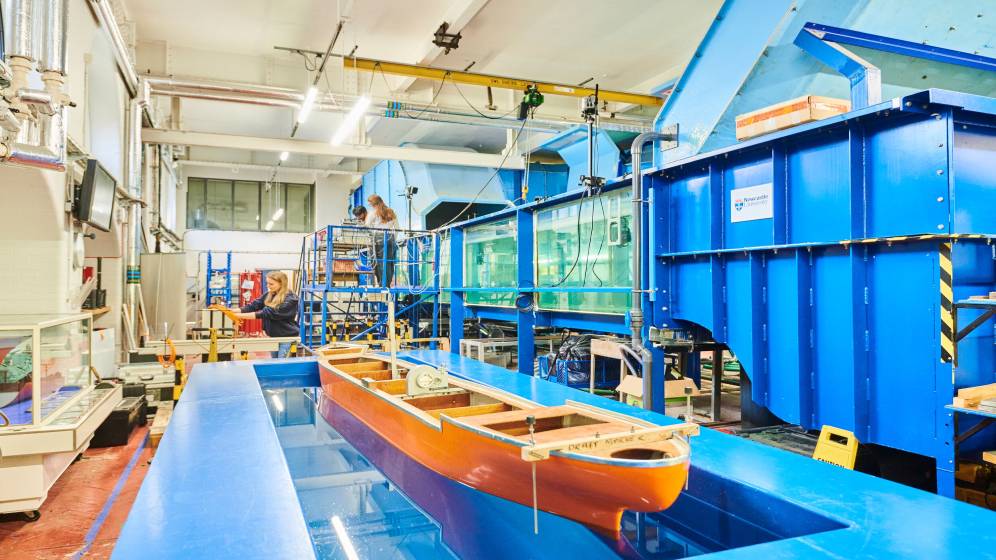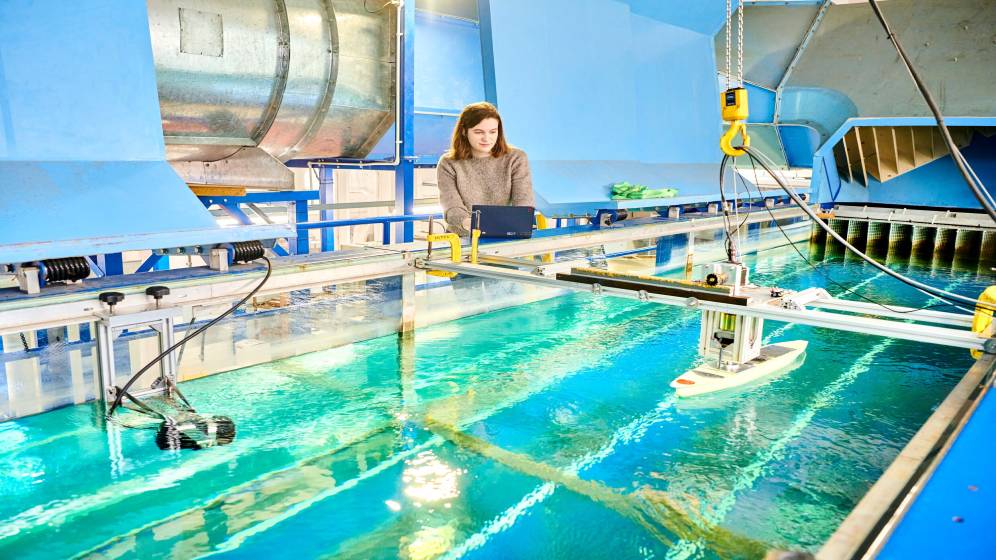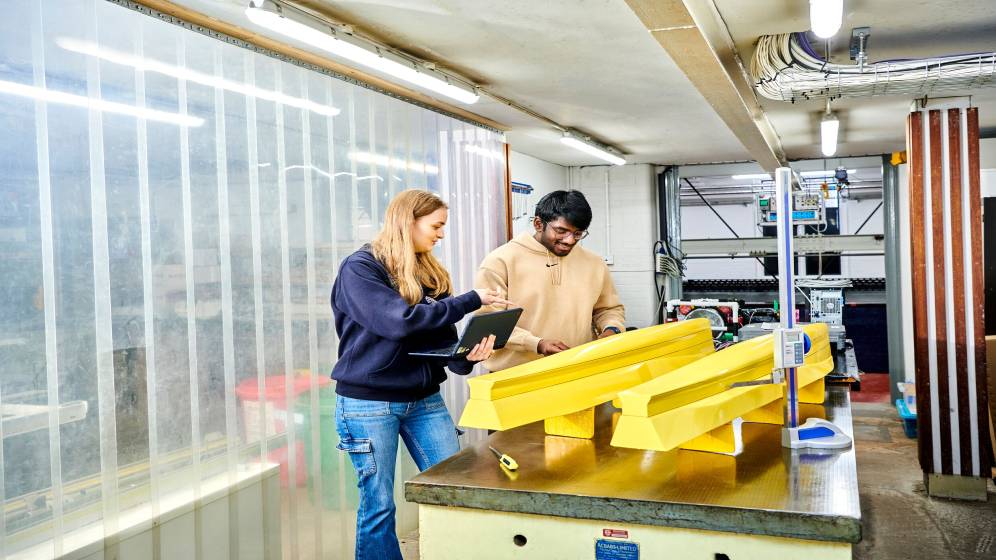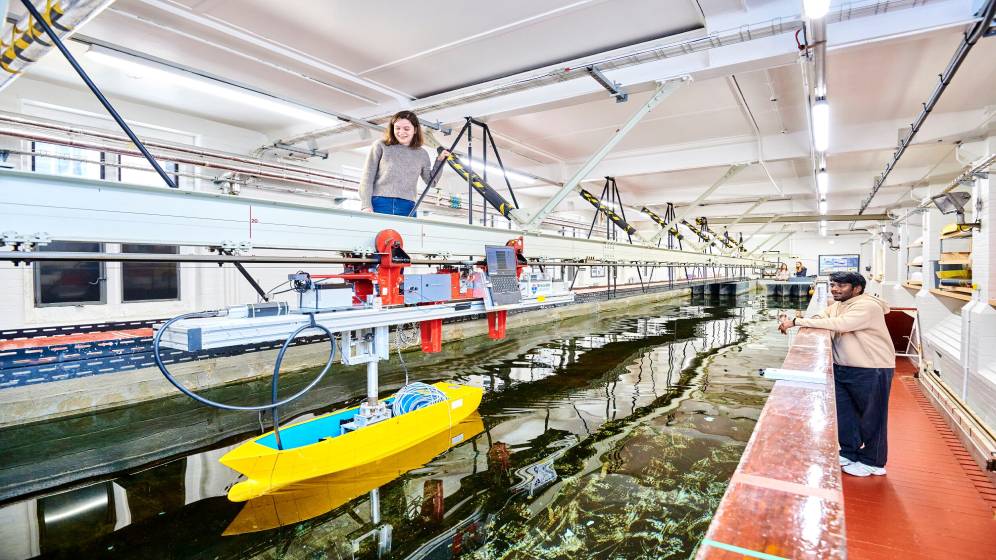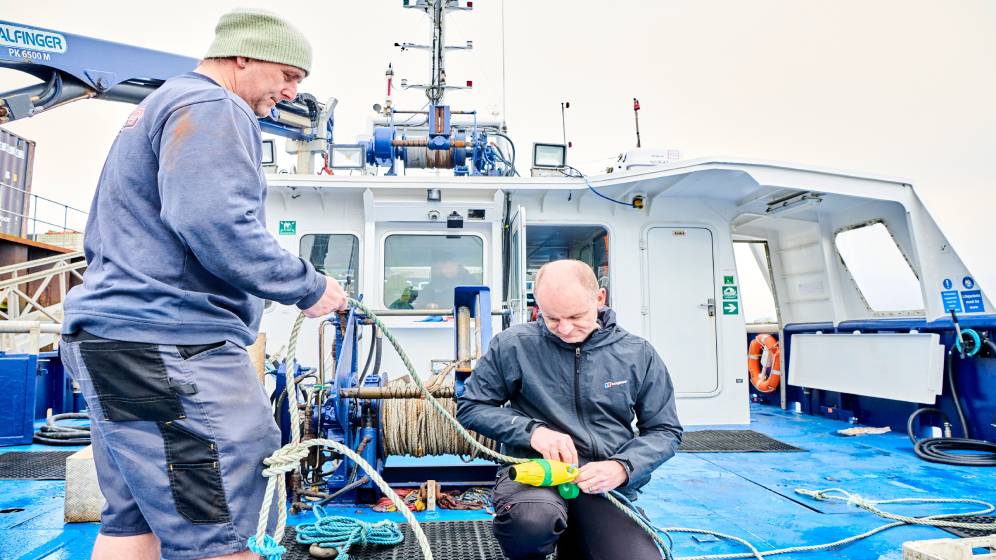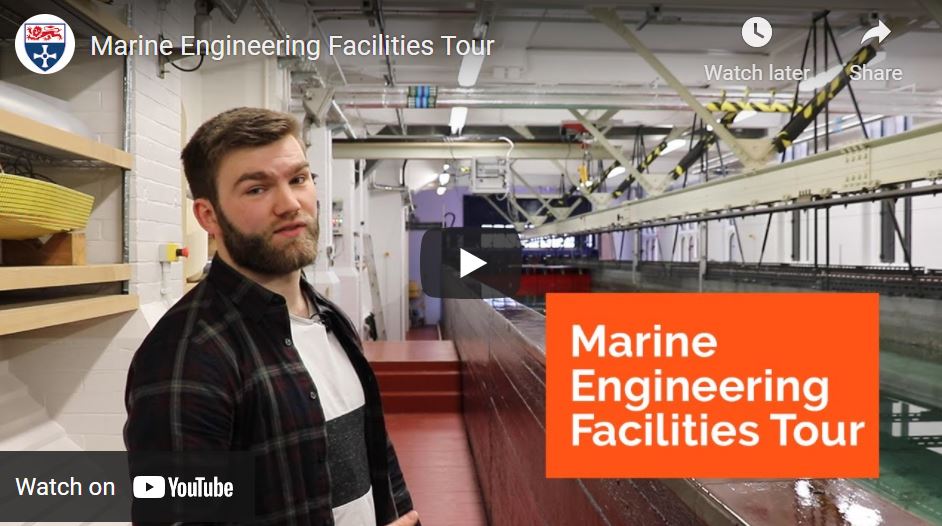Naval Architecture and Marine Engineering BEng Honours
- UCAS code: H515
- Full time
- 3 years
Our three-year BEng Honours degree focuses on the design and operation of marine vehicles and offshore infrastructure.
You are currently viewing course information for entry year: 2026
Next start date:
- September 2026
UCAS Institution name and code:
- NEWC / N21
Course overview
Our degree in Naval Architecture and Marine Engineering focuses on the design and operation of marine vehicles and offshore infrastructure. You'll learn how to design specialist systems using the latest technologies.
We design our curriculum and projects with leading companies. You'll take part in our annual design pitch, where you can showcase your project work to industry partners.
Working on multidisciplinary team projects, you'll gain hands-on experience in key areas such as:
- energy applications
- marine vehicle design
- marine technologies
- experimental and numerical analysis
You’ll develop the technical and professional skills needed to excel in the evolving field of naval architecture and marine engineering.
BEng or MEng?
Both our BEng and MEng degrees provide a pathway to becoming a Chartered Engineer. This is one of the most recognisable international engineering qualifications.
Our MEng degrees are a direct route to becoming a Chartered Engineer (CEng). You don’t need to study any more qualifications after your degree to work towards chartered status.
Our three-year BEng degrees can also lead to Chartered Engineer status. However, you’ll need to complete further study, such as an approved master’s degree.
Transfer from a BEng to an MEng degree is possible up to the end of Stage 3 if you achieve the appropriate academic standard.
READ MORE
Your course and study experience - disclaimers and terms and conditions
Please rest assured we make all reasonable efforts to provide you with the programmes, services and facilities described. However, it may be necessary to make changes due to significant disruption, for example in response to Covid-19.
View our Academic experience page, which gives information about your Newcastle University study experience for the academic year 2025-26.
See our terms and conditions and student complaints information, which gives details of circumstances that may lead to changes to programmes, modules or University services.
Quality and ranking
Professional accreditation and recognition
All professional accreditations are reviewed regularly by their professional body.
Modules and learning
Modules
The information below is intended to provide an example of what you will study.
Most degrees are divided into stages. Each stage lasts for one academic year, and you'll complete modules totalling 120 credits by the end of each stage.
Our teaching is informed by research. Course content may change periodically to reflect developments in the discipline, the requirements of external bodies and partners, and student feedback.
Optional module availability
Student demand for optional modules may affect availability.
Full details of the modules on offer will be published through the Programme Regulations and Specifications ahead of each academic year. This usually happens in May.
To find out more please see our terms and conditions
Stage 1 will provide a broad introduction to the principles of engineering. You'll study engineering in a marine context through the specialist module Marine Design and Professional Skills.
Modules
| Compulsory Modules | Credits |
|---|---|
| Engineering Mathematics I | 20 |
| Electrical and Magnetic Systems | 15 |
| Electronics and Sensors | 10 |
| Thermofluid Mechanics | 15 |
| Properties & Behaviour of Engineering Materials | 15 |
| Mechanics I | 15 |
| Marine Design and Professional Skills | 30 |
You'll gain a firm foundation in engineering principles covering topics in core subjects, including ship hydrodynamics and engineering mathematics, which we relate to the broad scope of marine technology.
Modules
| Compulsory Modules | Credits |
|---|---|
| Engineering Mathematics II | 10 |
| AC Electrical Power and Conversion | 10 |
| Business and Law for Engineers | 10 |
| Further Naval Architecture | 20 |
| Marine Engineering II | 20 |
| Ship Hydrodynamics | 20 |
| Applications of Engineering II | 10 |
| Marine Structures I | 20 |
You'll continue with core modules to develop your knowledge. You'll study specialist modules including marine production management and ship and system design. You'll also complete a dissertation.
Modules
| Compulsory Modules | Credits |
|---|---|
| Marine Transport Business | 10 |
| Marine Engineering III | 20 |
| Further Ship Hydrodynamics | 20 |
| Marine Production Management | 10 |
| Ship and Systems Design | 30 |
| Dissertation in Maritime Engineering | 30 |
We base these figures and graphs on the most up-to-date information available to us. They are based on the modules chosen by our students in 2024-25.
Teaching time is made up of:
- scheduled learning and teaching activities. These are timetabled activities with a member of staff present.
- structured guided learning. These are activities developed by staff to support engagement with module learning. Students or groups of students undertake these activities without direct staff participation or supervision
Teaching and assessment
Teaching methods
Contact hours will be a combination of:
- lectures
- seminars from invited speakers in industry and academia
- practical work
Assessment methods
You'll be assessed through a combination of:
-
Coursework
-
Dissertation or research project
-
Examinations – practical or online
-
Group work
-
Presentations
-
Reports
Skills and experience
Practical skills
You'll gain invaluable hands-on experience with our state-of-the-art facilities. These include:
- a model-testing towing tank
- our unique wind, wave and current tunnel
- advanced computing facilities
- our cavitation tunnel, which is the largest commercial propeller test tunnel in the UK
Throughout your studies, you'll also take part in a range of exciting industry visits. You'll explore local and national marine production facilities and infrastructure sites, giving you direct insight into the dynamic world of maritime engineering.
Real business skills
We design our curriculum and projects with leading companies. You'll take part in our annual design pitch, where you can showcase your project work to industry partners. You'll learn invaluable career skills including delivering a pitch and negotiation.
Your practical and professional skills will develop through interactions with industry.
Research skills
You'll develop strong research skills as you undertake practical lab work and a dissertation in Stage 3. Access to our extensive library resources, specialised software, and advanced experimental testing facilities will support you through your course.
Opportunities
Work placement
Apply your practical skills, increase your confidence and gain real-life work experience to accelerate your career. Take a 9-12-month industrial placement in the UK or abroad. Work placements usually take place in stage 3 of your studies and extend your degree by one year.
Facilities and environment
Facilities
You'll be part of the School of Engineering and you'll learn in state-of-the-art labs and fantastic facilities, many of which are unique to Newcastle University. You'll have access to our:
- unique large-scale laboratories to help you learn and understand concepts taught in class
- Blythe Marine Station and our high-speed research vessel, The Princess Royal
- cavitation tunnel to test models of propellers, turbines, submarines and more
- towing tank to conduct ship and offshore model tests
- combined wind, wave and current tank to experience modelling of the full offshore environment
- hydrodynamics laboratory with wave-making and electronic recording equipment
- engine laboratories, which include facilities to test diesel engines
- dedicated computer cluster running specialist marine design software
- university, regional and national HPCs (High-Performance Computing)
- specialist marine technical library and historical archive
Support
At Newcastle, you'll join a vibrant, global community of staff and students in the School of Engineering.
To support you in your studies, all new students entering year 1 or year 2 will receive a start-up pack containing essential personal protective equipment.
You'll have the support of an academic member of staff as a personal tutor throughout your degree to help with academic and personal issues.
Peer mentors will help you in your first year. They are fellow students who can help you settle in and answer any questions you have when starting university.
Your future
Join a network of successful graduates
You'll benefit from our strong industrial links with:
- Lloyd’s Register
- Babcock
- BP
- BAE Systems
- the Royal Navy
- British Maritime Technology (BMT)
- Royal IMC
- Technip FMC
- ABS
- Society of Maritime Industries (SMI)
- Equinor
- Eurobulk Ltd
- Sonardyne
- Kairos Technology
- Cammell Laird
- North Star
- Lloyd's Register Marine
- Disney Cruise Line
Recent graduates have taken up roles such as:
- graduate engineer
- naval architect
- development engineer
- project engineer
- graduate naval architects
- Royal Navy trainee officer
- graduate technical officer
Be part of a thriving sector
The marine technology sector is currently thriving worldwide and in many areas there are acute shortages of skilled personnel.
UK-based and multinational companies have a demand for degree-qualified:
- marine engineers
- naval architects
- experts in computer-aided design
- engineering specialists
- production specialists and managers
- surveyors
- research and policy development
A large proportion of Marine Technology graduates find employment in:
- the ship and offshore construction industry
- shipping and offshore companies
- government departments
- classification societies
- regulatory agencies and consultancy firms
- offshore renewable energy generation
The development of deep-water oil and gas recovery has increased demand for specialists in the design and operation of offshore vessels and processing plants.
An increasing number of graduates enter careers in the design and manufacture of yachts, luxury cruisers and high-speed passenger craft.
A number of our students also go on to postgraduate study and research into new technologies.
Make a difference
Sorry, you need JavaScript to view this video
Careers support
You'll be given networking opportunities through our close connections to industry and professional marine organisations.
We also organise a marine careers fair every year, attracting graduate recruiters such as:
- Lloyd’s Register
- Babcock
- BP
- BAE Systems
- the Royal Navy
Our Careers Service is one of the largest and best in the country, and we have strong links with employers. We provide an extensive range of opportunities to all students through our ncl+ initiative.
Visit our Careers Service website
Recognition of professional qualifications outside of the UK
If you’re studying an accredited degree and thinking about working in Europe after you graduate, the best place to find current information is the UK Government’s guidance on recognition of UK professional qualifications in EU member states. This official resource explains whether your profession is regulated in another country, what steps you need to take, and which organisation you should contact.
Additional information
Singapore study option (international students)
Working with the Singapore Institute of Technology, Newcastle University offers full-time BEng Honours degrees in Singapore, in:
- Marine Engineering
- Offshore Engineering
- Naval Architecture
These provide international students with the opportunity to study marine technology subjects from Newcastle University in Singapore.
Entry requirements
All candidates are considered on an individual basis and we accept a broad range of qualifications.
The entrance requirements and offers below apply to 2026 entry.
| A-Level | |
|---|---|
| International Baccalaureate | |
|---|---|
Other UK and the Republic of Ireland qualifications
Alternative offers at Newcastle
Through one of our contextual or alternative offer routes, you could receive an offer of up to three grades lower than the typical requirements.
Contextual offers
We use certain contextual data from your UCAS form, alongside your application, to consider challenges that you may have faced in your education and the potential effect this may have had on your qualifications. This means you may be eligible to receive a lower contextual offer.
PARTNERS offers
One of the largest and longest support entry routes to university of its kind for students from underrepresented backgrounds. We support applicants from application through to study.
Realising Opportunities offers
A unique programme delivered in collaboration with 10 leading, research-intensive universities in the UK. The programme is open to students in Year 12/first year of college.
Pathways to Newcastle offers
Pathways to Newcastle, our national skills entry route, is available for specific subject areas.
High Performance Athletes
We support promising athletes at the application stage, who compete in regional, national or international levels in their sport.
Qualifications from outside the UK
English Language requirements
Entrance courses (INTO)
International Pathway courses are specialist programmes designed for international students who want to study in the UK. We provide a range of study options for international students in partnership with INTO.
These courses are specifically designed for international students who want to study in the UK and progress onto one of our undergraduate degrees. Our International Study Centre, has a range of study options including:
- International Foundation
- International Year One
- English Language courses
Find out more about International Pathway courses
Admissions policy
This policy applies to all undergraduate and postgraduate admissions at Newcastle University. It is intended to provide information about our admissions policies and procedures to applicants and potential applicants, to their advisors and family members, and to staff of the University.
University Admissions Policy and related policies and procedures
Credit transfer and Recognition of Prior Learning
Recognition of Prior Learning (RPL) can allow you to convert existing relevant university-level knowledge, skills and experience into credits towards a qualification. Find out more about the RPL policy which may apply to this course.
Tuition fees and scholarships
Tuition fees for academic year 2026-2027
The 2026 entry home fees have not yet been confirmed.
| Qualification: BEng Honours | |
|---|---|
|
Home students full time 3 years |
Tuition fees (Year 1)
Not set |
|
International students full time 3 years |
Tuition fees (Year 1)
30,700 |
Year abroad and additional costs
For programmes where you can spend a year on a work placement or studying abroad, you will receive a significant fee reduction for that year.
Some of our degrees involve additional costs which are not covered by your tuition fees.
Scholarships
Find out more about:
Open days and events
You'll have a number of opportunities to meet us throughout the year at our on-campus and virtual open days.
You'll be able to:
- explore our beautiful campus
- find out about our vibrant city
- discover what students think about studying at Newcastle
You'll also have the opportunity to speak to academic staff and find out more about the subjects you're interested in.
Find out about how you can visit Newcastle in person and virtually.
We regularly travel overseas to meet with students interested in studying at Newcastle University. Visit our events calendar to find out when we're visiting your region.
How to apply
Apply through UCAS
To apply for undergraduate study at Newcastle University, you must use the online application system managed by the Universities and Colleges Admissions Service (UCAS). All UK schools and colleges, and a small number of EU and international establishments, are registered with UCAS. You will need:
- the UCAS name and institution codes for Newcastle University (NEWC/N21)
- the UCAS code for the course you want to apply for
- the UCAS 'buzzword' for your school or college
If you are applying independently, or are applying from a school or college which is not registered to manage applications, you will still use the Apply system. You will not need a buzzword.
Apply through UCASApply through an agent
International students often apply to us through an agent. Have a look at our recommended agents and get in touch with them.
Get in touch
By phone
Call us on +44 (0) 191 208 3333 and press option 1. Our opening hours are Monday to Friday 10am until 4pm.
Live chat
Our NCL chatbot might be able to give you an answer straight away. If not, it’ll direct you to someone who can help.
You'll find our NCL chatbot in the bottom right of this page.
Online
Chat to our students
Choosing a university is a big decision. If you've got questions about a particular course, student life or the city of Newcastle, why not chat to our friendly students or graduates!
Keep updated
We regularly send email updates and extra information about the University.
Receive regular updates by email





